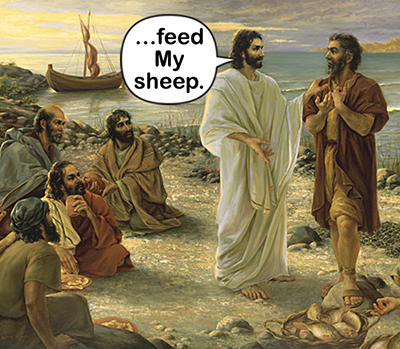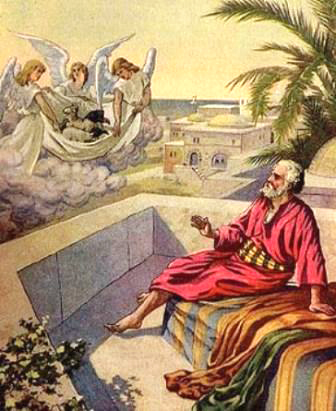I’ve been able to complete a 29 minute video on Daniel chapter 8. You can click here to see the full version.
There is also a two minute clip of the video for those who’d like to have a preview.
This is the fourth in the series of videos I’ve been working on concerning Bible prophecy and the prophetic chapters in the book of Daniel. Like the other videos before this one, much of the video is filled with illustrations of Daniel, the angel Gabriel, “the ram and the goat”, Alexander the Great, and the Antichrist of the endtime. Much of this was partially fulfilled in ancient history. But it’s explained in the video how there are important parts that are yet to be fulfilled in the times leading up to the return of Jesus.
This chapter builds solidly on the previous revelations of Daniel chapter 7 where we saw the 4 beasts. But, in putting the video together, I was struck by how much this chapter lays the groundwork for what is revealed in perhaps the most important chapter, Daniel 9.
For example, perhaps the most difficult part of Daniel 8 is where, almost out of the blue, two angels are discussing “the sanctuary”, “the daily sacrifice” and “the transgression that makes desolate”.  These are all totally new subjects to these visions and prophecies but they introduce key factors in the revelation of Daniel 9.
These are all totally new subjects to these visions and prophecies but they introduce key factors in the revelation of Daniel 9.
Understanding this information and seeing how it all fits is a challenge for those who are new to all this. In fact, we find that during this revelatory experience, Daniel himself evidently fainted twice. He said the vision disturbed him for days and that he didn’t himself understand it. So we can expect that it will not be all that easy to understand for those who are going over these things for the first time.
 There’s much in this chapter about Greece and Alexander the Great. There is also key information about the Antichrist of the endtime. And we note that Gabriel specifically tells Daniel three times that the vision relates to “the end”. This is particularly important because some Bible teachers have tried to say that the most important parts of this chapter were already fulfilled in the century or two before the birth of Jesus in Bethlehem.
There’s much in this chapter about Greece and Alexander the Great. There is also key information about the Antichrist of the endtime. And we note that Gabriel specifically tells Daniel three times that the vision relates to “the end”. This is particularly important because some Bible teachers have tried to say that the most important parts of this chapter were already fulfilled in the century or two before the birth of Jesus in Bethlehem.
As I’ve done in the other videos, this class has been produced with the target audience being folks who are mostly new to the subject of Bible prophecy. There are English subtitles which will help those whose first language is not English.
I hope this video will be a blessing to you and yours. I’d be glad to hear any questions or comments on how these videos can be more of a help to you. You can reach me at mark@markmcmillion.com. God bless you, love you lots! Mark






 And strangely, another time in the Bible it says that Peter was told something three times from God, in no uncertain terms. In Acts chapter 10 Peter was in Joppa in northern Israel. Peter was the head of the growing group of believers who spread Jesus’ message and truth, after He’d ascended to heaven years before. Peter was on a house top, in prayer, when in a vision he saw a sheet let down from heaven with all kinds of “unclean” animals. The Laws of Moses gave strict rules for the Jews as to what animals were “clean” to eat, permissible, and which ones weren’t.
And strangely, another time in the Bible it says that Peter was told something three times from God, in no uncertain terms. In Acts chapter 10 Peter was in Joppa in northern Israel. Peter was the head of the growing group of believers who spread Jesus’ message and truth, after He’d ascended to heaven years before. Peter was on a house top, in prayer, when in a vision he saw a sheet let down from heaven with all kinds of “unclean” animals. The Laws of Moses gave strict rules for the Jews as to what animals were “clean” to eat, permissible, and which ones weren’t. The Jews weren’t supposed to have anything to do with Gentiles and certainly not go to their house.
The Jews weren’t supposed to have anything to do with Gentiles and certainly not go to their house.  In Daniel chapter 8 something similar also happened. In a vision, Daniel was by the river Ulai, in what’s now modern Iran, and the angel Gabriel was commanded to explain what Daniel had just seen, a goat and a ram clashing in battle and the goat conquering the ram. But there was more to it, much more, and Daniel tells us he just didn’t understand it. But the angel Gabriel then tells Daniel three times in two verses that “
In Daniel chapter 8 something similar also happened. In a vision, Daniel was by the river Ulai, in what’s now modern Iran, and the angel Gabriel was commanded to explain what Daniel had just seen, a goat and a ram clashing in battle and the goat conquering the ram. But there was more to it, much more, and Daniel tells us he just didn’t understand it. But the angel Gabriel then tells Daniel three times in two verses that “ “
“
 In John chapter 6, Jesus fed the multitude miraculously. We are told “5000 men” were there, so we can assume it was even a lot more people than that. After dividing up 5 loaves and 2 fishes to feed all those people, it says Jesus understood that there were those among the multitude right then who would “
In John chapter 6, Jesus fed the multitude miraculously. We are told “5000 men” were there, so we can assume it was even a lot more people than that. After dividing up 5 loaves and 2 fishes to feed all those people, it says Jesus understood that there were those among the multitude right then who would “ So, multitudes or disciples. And isn’t it the same today? Thank God that
So, multitudes or disciples. And isn’t it the same today? Thank God that 
 Goliath’s people, the Philistines, had been overlords and oppressors of the Jewish people for generations. But changes were in the air. God had raised up a very devout and faithful high priest, Samuel. And God had led Samuel to anoint a king for the first time in Israel, Saul.
Goliath’s people, the Philistines, had been overlords and oppressors of the Jewish people for generations. But changes were in the air. God had raised up a very devout and faithful high priest, Samuel. And God had led Samuel to anoint a king for the first time in Israel, Saul. The Philistines and the Israelites were again about to clash. But when it came time for battle, the Israeli fighters were in fear and awe of the champion warrior of the Philistines, Goliath. In modern times the tallest any person has been known to be is around 8½ feet tall. But the Bible says that in those times 3000 years ago there were giants and they were taller than any people are today.
The Philistines and the Israelites were again about to clash. But when it came time for battle, the Israeli fighters were in fear and awe of the champion warrior of the Philistines, Goliath. In modern times the tallest any person has been known to be is around 8½ feet tall. But the Bible says that in those times 3000 years ago there were giants and they were taller than any people are today.
 So did David collapse under his big brother’s withering accusations and condemnations? Did he loose heart and head back home in defeat and confusion? No. Before he faced the
So did David collapse under his big brother’s withering accusations and condemnations? Did he loose heart and head back home in defeat and confusion? No. Before he faced the 
 Sometimes “
Sometimes “


 But then the local enemies of the Jews wanted Nehemiah to “
But then the local enemies of the Jews wanted Nehemiah to “ Where there is faith, reverence and obedience to God, the Devil is always going about in one form or the other to try to destroy God’s plan and His people. This is a constant throughout history and it’s shown in this amazing way in the book of Nehemiah. We often think of Satan “
Where there is faith, reverence and obedience to God, the Devil is always going about in one form or the other to try to destroy God’s plan and His people. This is a constant throughout history and it’s shown in this amazing way in the book of Nehemiah. We often think of Satan “
 And those words, “
And those words, “

